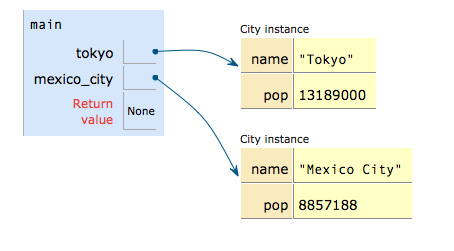- Enter the following code as lab13a.py:
"""
Program: Lab 13
Author: Your name
Define and test a basic City class.
"""
import sys
class City:
pass
def main():
tokyo = City('Tokyo', 13189000)
mexico_city = City('Mexico City', 8857188)
main()
- Your first task will be to define an __init__ method for the City class
that saves the city name and population into the new City object. First, answer
Question 1 in your writeup.
- Replace the pass in the implementation of City with the definition of an __init__ method
that saves the city name and population into the newly created object.
- Copy your code into the the online Python 3 tutor and visualize it. Hit Last and then hit Back once. You should see something like this at the bottom right:

- Returning to PyCharm, add the following lines of code to your program at the end of the definition of main:
print(tokyo)
print(mexico_city)
Run your program. You should see an output that looks something like
<__main__.City object at 0xe5ec10>
<__main__.City object at 0xe5ecd0>
This is because we haven't told Python how to represent a city as a string.
- When these print statements are executed, they will automatically call the __str__ method of our City
class -- if one is defined -- to get a string representation of the City object. Our next goal is to define a __str__ method.
Answer Question 2 in your writeup.
- Inside class City, add a definition of the __str__ method. Its goal should be to return a string with
the city's name and population formatted like this:
Tokyo (pop. 13189000)
or
Mexico City (pop. 8857188)
Rerun your program. You should see the two lines of output above.
- Add the following lines of code to the end of main():
# Print whichever city is larger
print('The larger city is:')
if mexico_city < tokyo:
print(tokyo)
else:
print(mexico_city)
Run your program. It should fail because we haven't told Python what it means for one City object to be smaller than another.
- Inside class City, add the following method definition:
def __lt__(self, other):
# Return True if the population of self is less than
# the population of other and return False otherwise
pass
- Replace the pass with code that compares the populations of self and other.
This code should return True if self has a lower population than other and False otherwise.
- Run your code one more time. You should see the following output:
Tokyo (pop. 13189000)
Mexico City (pop. 8857188)
The larger city is:
Tokyo (pop. 13189000)
- Continue to Part B.
